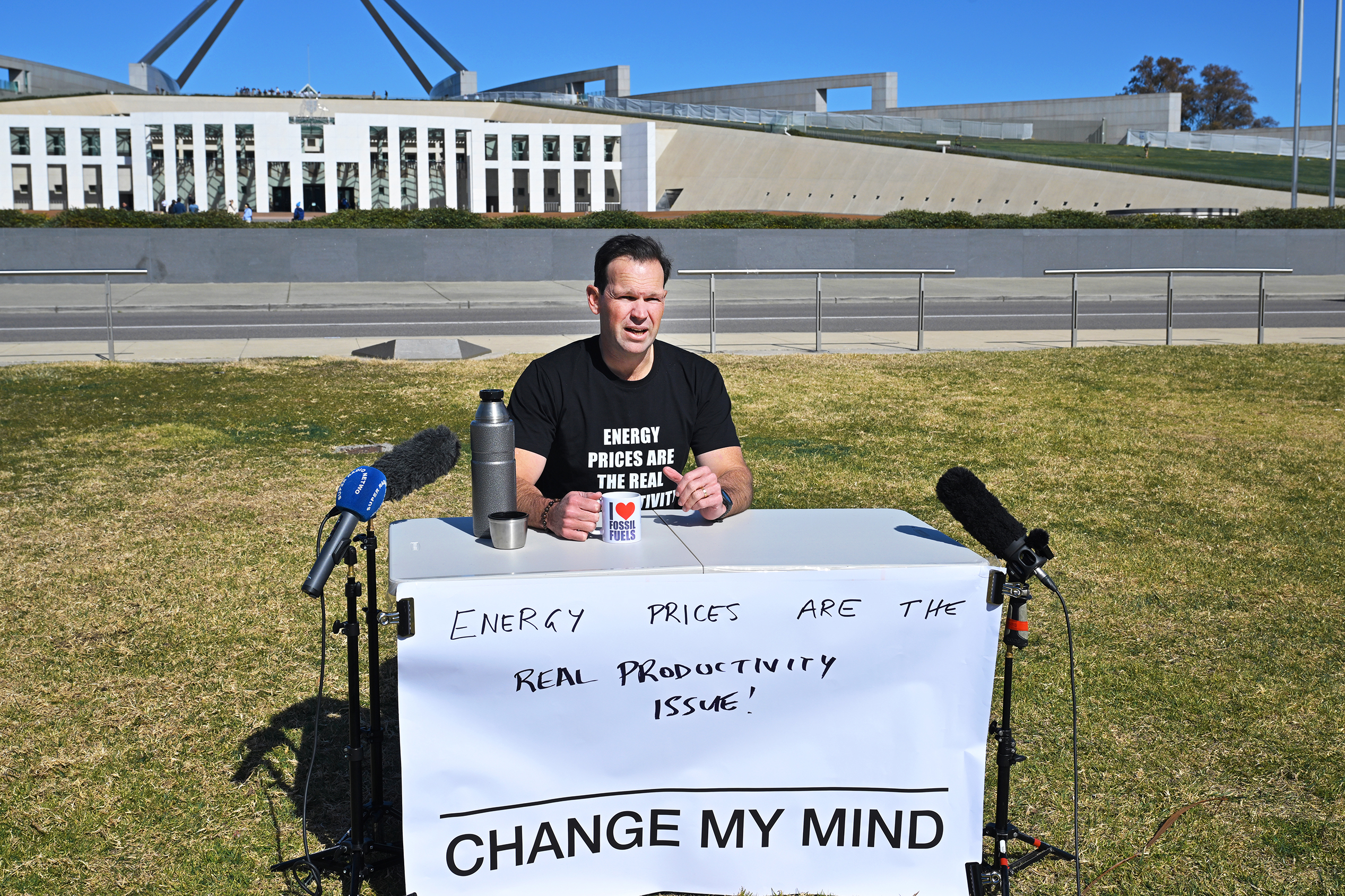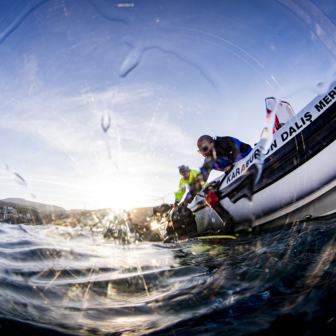Back in April 2015 Tony Abbott’s environment minister, Greg Hunt, boasted of the “stunning success” of the first “auction” under his government’s Emissions Reduction Fund. The ERF was the centrepiece of the “direct action” plan the Coalition had come up with to replace the Gillard government’s carbon price, aka “carbon tax,” which had operated from July 2012 to June 2014.
Under Labor’s policy, around $7.7 billion a year had been collected via a price on carbon emissions and returned to Australians through various channels but mostly direct tax cuts. The Abbott government, by contrast, paid companies to reduce their emissions. It was budgeted to cost around $2.5 billion over four years.
Wielding a nifty pea and thimble, Hunt used the emissions cut under the carbon price, the total money churned, the emissions cuts promised by businesses and the dollars paid to them to pronounce that “Labor’s $15.4 billion carbon tax reduced emissions at over $1300 per tonne” while his government’s scheme “averages $13.95 per tonne.” Labor’s “failed carbon tax was more than ninety-three times more expensive.”
This was a false comparison in many ways, the main one being the dollars: one figure (the ERF’s) was a cost to the budget and the other (Gillard’s) wasn’t.
That’s political spin for you — nice work if you can get away with it — and if you’re very lucky journalists will pick it up and run. In this case no journo obliged with more vigour than the Australian’s foreign editor Greg Sheridan who, in a celebratory column, wrote that Hunt (yes, Hunt personally) was “going to cut Australia’s carbon emissions four times more than Labor did with its carbon tax at 1 per cent price per tonne of emissions…”
Sheridan evidently liked the cut of Hunt’s jib, for his columns in those years were littered with glowing mentions of the frontbencher — too many to list, in fact, but here’s a sample and a final farewell.
Hunt is long gone, and these days the object of Sheridan’s besottedness seems to be Matt Canavan, the coal-revering Queensland LNP senator. Canavan was a minister in the Turnbull and Morrison governments, and Sheridan is very much of the opinion he should be back on the frontbench. In particular, Greg shares his conviction that the Coalition should abandon the net-zero-by-2050 target.
In May this year, Canavan shared on social media a screenshot of a London Daily Telegraph headline “New Zealand Abandons Jacinta Arden’s Net Zero Push” and added his own words: “New Zealand just dropped net zero. Why do we remain committed to this madness?”
The Tele’s headline, repeated in the article’s introduction, was fake news: New Zealand hasn’t dropped net zero. (But if you google the words you’ll find them gleefully repeated many times.) The piece instead referred to that country’s National government’s plans to “invest NZ$200m (£90m) in new offshore gas fields,” overturning Labour’s fossil fuel policy. If expanding gas exploitation is abandoning net zero, then the Albanese government has also dropped the target.
Within days, Sheridan was writing that the “Nationals in New Zealand… are abandoning the inherently fraudulent concept of net zero” and Australia’s federal opposition should do the same. And, of course, “By far the most policy-competent and intellectually substantial National is Queensland senator Matt Canavan.”
Sheridan articles railing against net zero — both in itself and as Coalition policy — and advocating Canavan’s return to the frontbench have been many. One, in early August, began by asserting that “there’s not a centre-right party in the English-speaking world, Nationals senator Matt Canavan points out, that remains committed to achieving net-zero greenhouse gas emissions by 2050,” though he equivocated further down that “New Zealand’s government has kept the notional commitment but reversed Labour’s main policy actions.”
There was more. The Economist magazine, that “high-gloss rendition of every globalist piety,” has “crossed a Rubicon by declaring the world should abandon net zero by 2050 as a hard target and conceive of it as a “more of a guideline strategy.’” Sheridan has repeated this interpretation of the Economist’s view several times since, including last Sunday on ABC’s Insiders.
Is it true? Well, it’s nuanced. The magazine’s editorial stated that the “scientific rationale for net zero is strong” and an “end to warming requires the level of greenhouse gases in the atmosphere to stop increasing… The logic is inescapable.” But the politics being fraught, and politics being the art of the possible, leaders need to make sure the perfect doesn’t get in the way of the good.
The magazine distinguished between wealthy countries (like Australia) and the majority that aren’t but are trying to be. The latter’s carbon ambitions, starting off such low bases, are “[in] many cases… barely physically imaginable, let alone politically feasible.” But wealthy countries, rather than “abandon stringent net-zero targets outright” should “find ways to ease [such targets] into the ‘more of a guideline’ category,” even if it means sacrificing economic purity.
So the Economist lauded, for example, Canadian prime minister Mark Carney’s decision to “rescind the aspects of Canada’s carbon-pricing scheme that affect [voters] directly.” That was the largest component of that country’s scheme, a tax on fuel, applied at the level of consumption. (Australia has never had such a tax. And Canada’s federal government still has a carbon price rather like our 2012–14 one but involving much smaller dollar amounts, as well various state abatement schemes.)
It’s a huge exaggeration, at best, to say the Economist takes the view that we should “forget about net zero as a guiding principle because it’s just not going to happen,” as Sheridan did on Insiders on Sunday. Greg’s most recent net zero piece, on Wednesday this week, had something for everyone: advice for Ley, more Matt, another dubious reference to the Economist, even Greg Hunt.
As far as I can tell (cheat sheet: AI) no country has followed Sheridan’s advice and dropped net zero, not even Argentina (yet) under Javier Milei. But some parliamentary oppositions have, including the British Tories — and Nigel Farage’s Reform party, which is leading that country’s voting-intentions opinion polls.
Australia might or might not get to net zero, but it’s hard to be optimistic about the planet’s ability to hit the goal by 2050. If global warming was restricted to the geographic area in which the carbon was let loose into the atmosphere, the incentives would be different. As it is, every country is encouraged to freeload.
But is the Economist’s realpolitik actually realistic? Can a government proclaim a goal that’s only an aspiration? Maybe the Albanese government is conforming to that prescription by having a net zero target, albeit one that many experts believe won’t be met, while not moving ahead of the international pack. And another actual carbon price for this country — forget about it.
And what of the domestic politics down under? I’m never one to project the most recent election result and/or current surveys into the future and forecast government victories as far as the eye can see. Parties in opposition tend to flaunt their flaws, and these are particularly discernible through the prism of disastrous polling numbers. The same defects are also present during their stints in office, though, and they are a driver of the ever-falling major-party support. But the total major-party election share after preferences still has to add to 100 per cent.
The electoral cycle goes on, voters will one day well and truly tire of this Labor government, as they tired of the Coalition three years ago, and a change of government will be in the offing, albeit in the context of that expanding crossbench.
With the evidently red-pilled Andrew Hastie promising to quit the frontbench if net zero is not discarded, other Liberals rumoured to intend the same, and the Nationals deeply anti-zero, Sussan Ley’s five-month-old leadership appears fragile.
Mr Sheridan will probably get his wish on Coalition climate policy, if not necessarily the full Canavan-as-shadow-minister quinella. Abandoning net zero in opposition probably doesn’t make much difference to how voters see them. The median Coalition MP has never seemed to believe global warming is real, let alone that Australia should do anything about it. It didn’t stop them winning three elections on the trot.
The danger for the opposition lies in the prospect of people like Canavan having an influence on energy policy in general. He is, for example, very keen on building new coal power stations — a fringe position. If undoing moves towards renewable energy actually became opposition policy it wouldn’t only be a “signal” to the electorate that they’re a bunch of out-of-touch blokey troglodytes. It would also mean taking big policy targets to future elections.
Back when the “carbon tax” was legislated in 2011 and implemented the following year, it was against the backdrop that most people expected the next election would result in the policy being undone. Today, by contrast, virtually everyone assumes that 2028 will be a shoo-in for Labor and the earliest the Coalition can conceivably take office is 2031.
So, twelve to fourteen years ago, big business made plans for the demise of the carbon price and then agitated like hell and poured cash into the Liberal coffers to make sure that happened. That won’t be the case in 2028 if the opposition is promising to upend a more deeply embedded climate policy.
Through my prism, one election result never tells us much about the next one. But that general expectation about the 2028 election is probably correct, and the chief reason is that America’s White House will contain either Donald Trump or J.D. Vance and will hence still be a madhouse.
If the Coalition campaigns then, or in 2031, to unscramble the renewables egg, regardless of how on the nose the government is, and even if voters are blaming it for high power prices… well we know from experience that even an electorate ready to toss out an incumbent can be driven back into its arms if the alternative is too stress-inducing.
The big danger for Coalition MPs is that they put their climate change policy money where most of their mouths are. •





